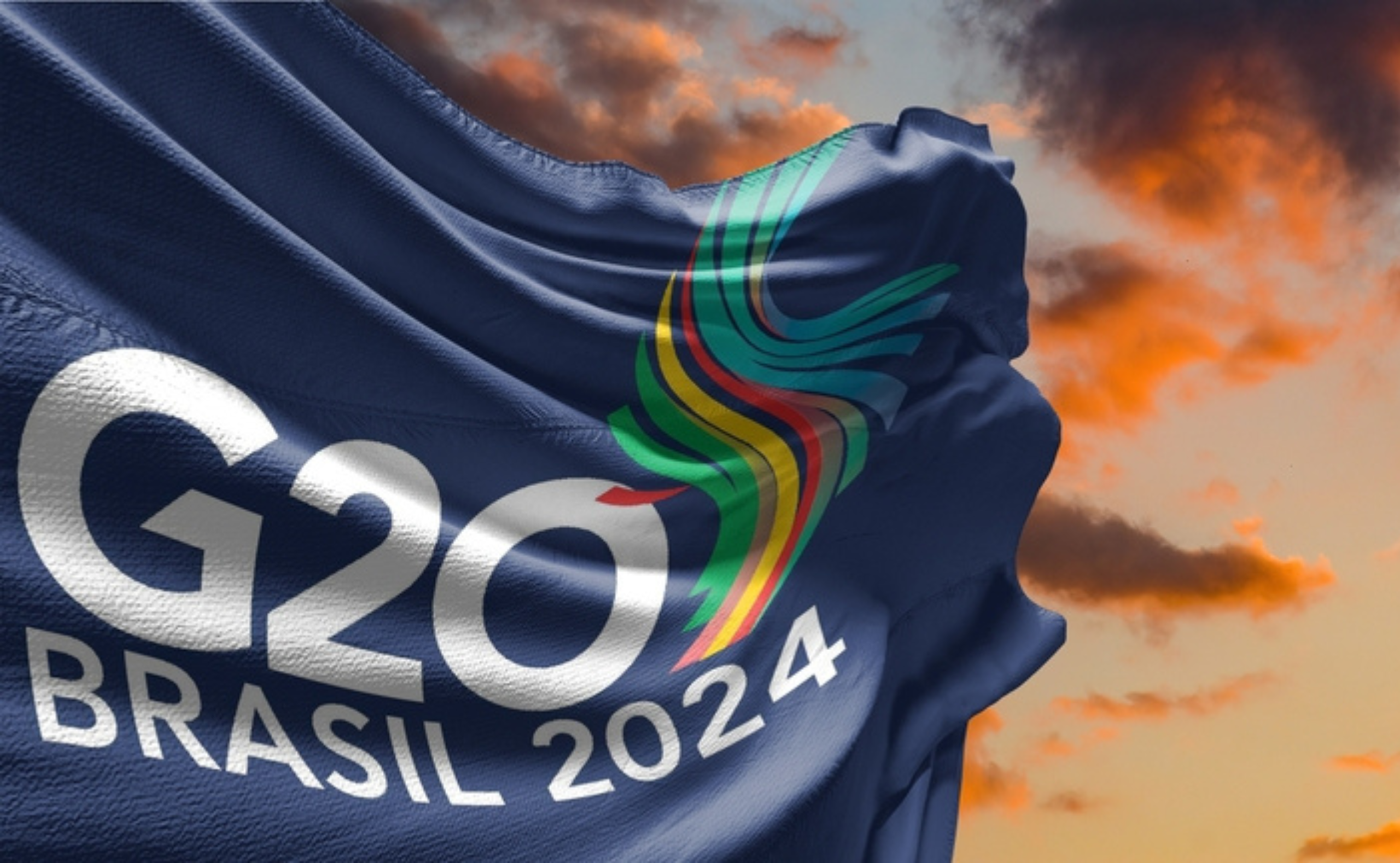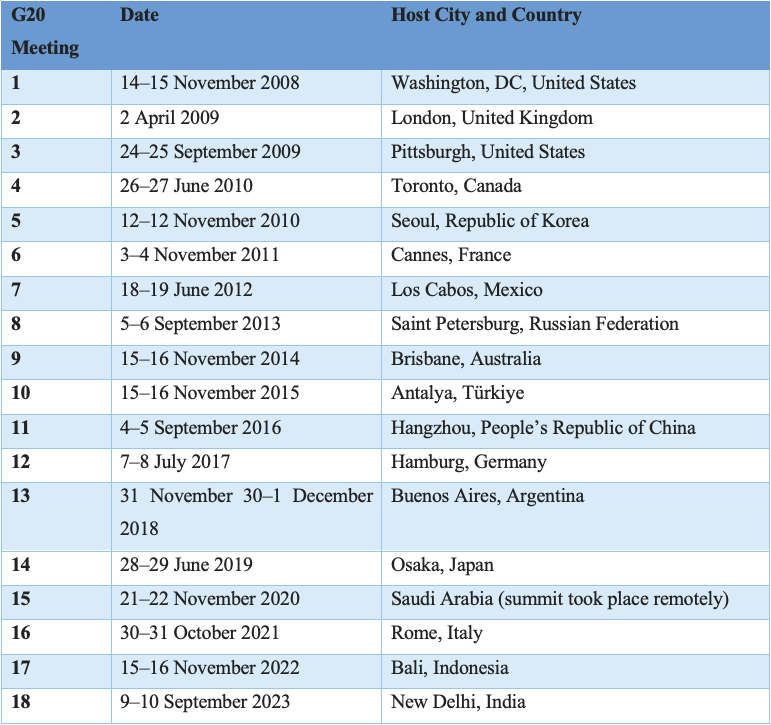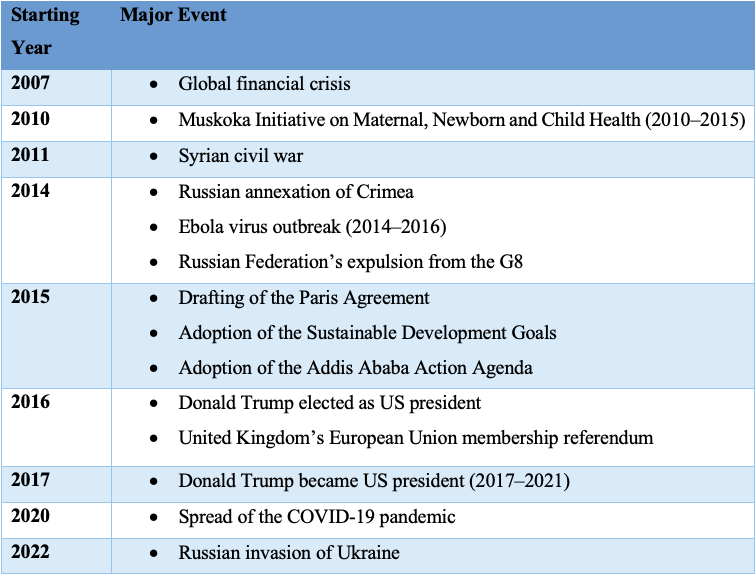
This year’s G20 Leaders’ Summit, to be held on 18 and 19 November in Rio de Janeiro, marks the first-ever G20 meeting in Brazil. Leaders will make commitments influencing global development agendas in fields such as health, artificial intelligence, emerging technologies, agriculture, food, and nutrition. Tracking these commitments and their impact on international affairs is crucial.
Accountability and transparency are fundamental principles of the G20 and are essential for maintaining the credibility of the commitments made by its leaders while cementing their leadership role in global affairs. At the first summit in Washington, DC in 2008, G20 leaders pledged to take rapid action to implement their commitments. At the subsequent summit in April 2009 in London, the leaders resolved to work together with urgency and determination to turn these words into action. To review progress on their commitments, they agreed to meet again before the end of 2009. At the Seoul summit in 2010, the leaders reaffirmed their dedication and pledged, “What we promise, we will deliver.” This commitment to transparency and accountability has been reiterated in subsequent meetings, reflecting the G20’s ongoing emphasis on upholding promises and maintaining credibility.
G20 leaders underscored the importance of heightened accountability, which led to the establishment of the G20 Development Working Group (DWG) in 2010. The DWG was created to ensure focused and transparent development efforts, enhancing the effectiveness and credibility of the G20’s development actions.
In 2012, the G20 leaders agreed on the Los Cabos Accountability Assessment Framework, recognizing transparency and accountability as crucial to enhancing credibility and fostering confidence. This framework complements the Growth and Jobs Action Plan and outlines procedures for reporting progress in implementing policy commitments.
During the Russian Presidency in 2013, the DWG produced its first Accountability Report. Under the Australian Presidency in 2014, the Accountability Framework was introduced, aiming to enhance the G20’s accountability and transparency.
In 2016, G20 leaders adopted the G20 Action Plan on the 2030 Agenda for Sustainable Development. The DWG’s accountability products were then adapted to categorize reporting on progress toward development commitments by Sustainable Development Sectors (SDS). This structured, sector-specific approach improved clarity and focus, enabling more transparent monitoring of progress in key areas. The G20’s enhanced capacity to track commitments allowed it to address global development challenges with greater precision and accountability.
To further support the accountability commitment of the G20, the International Labour Organization (ILO) and the Organisation for Economic Co-operation and Development (OECD) published a report in 2023 titled Women at Work in G20 countries: Progress and Policy Action in 2022. The report assessed the status and progression of women in the workforce across G20 nations, providing a comprehensive overview of labor market participation, gender wage gaps, policy measures, and the impact of the COVID-19 pandemic on women’s employment.
Similarly, in 2023, the United Nations Development Programme (UNDP) and the OECD published The G20 Contribution to the 2030 Agenda in Times of Crises 2019-2023. This report evaluated the G20’s efforts to achieve the Sustainable Development Goals (SDGs) amid global crises, particularly during the COVID-19 pandemic and the war in Ukraine.
To contribute to the G20’s ongoing efforts to maintain transparency and accountability in its commitments, ADBI has published a compendium that provides a comprehensive overview of the group’s commitments across four critical areas: climate change; health; well-being; and agriculture, food, and nutrition.
The compendium provides a high-level overview and comprehensive analysis of the G20’s commitments, drawing from original commitments from the G20 leaders’ declarations, as well as insights from other relevant documents. It covers all declarations from the first summit in 2008 to the most recent summit in India in September 2023. Table 1 provides a summary of the host countries and dates of the G20 summits within the study period.
Table 1: Timeline of the G20 Meetings and Host Countries

G20 leaders have made their commitments against the backdrop of major global events, such as the Russian invasion of Ukraine, the COVID-19 pandemic, the spread of the Ebola and Zika viruses, and the signing of the Paris Agreement (Table 2).
Table 2: Major Events That Influenced the G20 Agendas

Similarly, the leaders’ commitments were made across themes shaped by the G20’s historical focus areas:
- 2008–2010: Addressing the global financial crisis and stabilizing economies
- 2011–2014: Economic recovery, job creation, and strengthening financial regulations
- 2015–2017: Inclusiveness, investment, innovation, and sustainable growth
- 2018–2020: Sustainable development, digitalization, and responding to the COVID-19 pandemic
- 2021–2023: Recovery from the pandemic, climate change, and sustainable development
The G20 has consistently emphasized its role as the premier forum for global economic cooperation, operating in the spirit of multilateralism and consensus. All members participate equally in G20 events, including summits, reflecting the diverse nature of its member countries. Consequently, G20 declarations often adopt flexible, inclusive, and accommodative language to appreciate this diversity. However, the G20 also aims to make more concrete and measurable commitments. For instance, at the 2023 and 2022 summits, leaders resolved to act through tangible and measurable partnerships. We echo the G20’s sentiment on the need for concrete, measurable, and deliverable commitments.
As the Rio de Janeiro summit approaches, it is critical that these commitments translate into actionable measures across sectors such as climate change, health, and agriculture. This summit presents an opportunity for the G20 to demonstrate its leadership by making credible, measurable commitments that can drive meaningful progress in addressing global challenges.
While there have been improvements, the G7 generally makes more robust and specific commitments than the G20. In the contentious area of climate change, the G20 must adopt more thorough and sector-specific commitments, drawing lessons from the G7’s approach.
Learn more about the G7 and G20’s commitments across these themes:









Comments are closed.